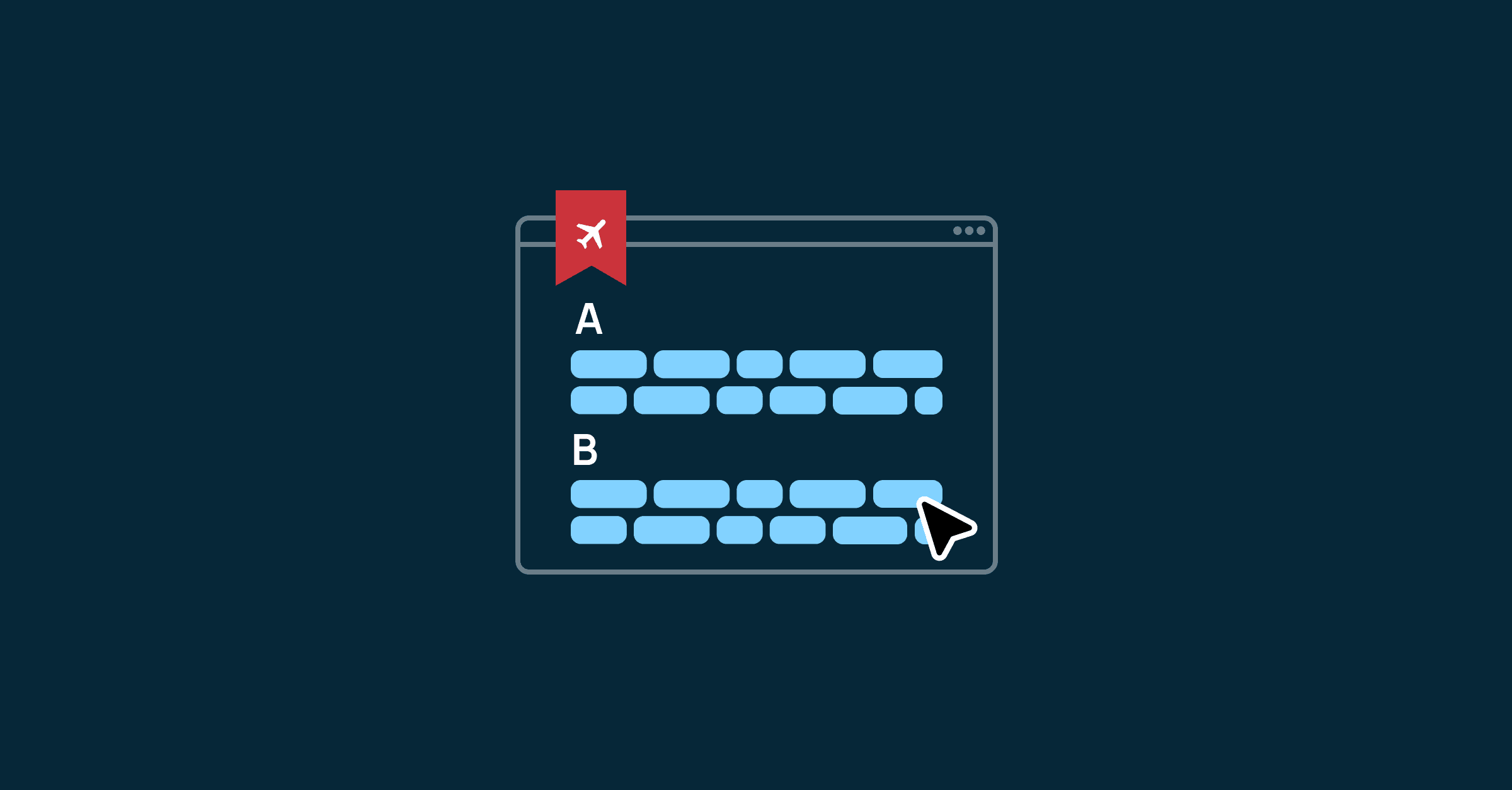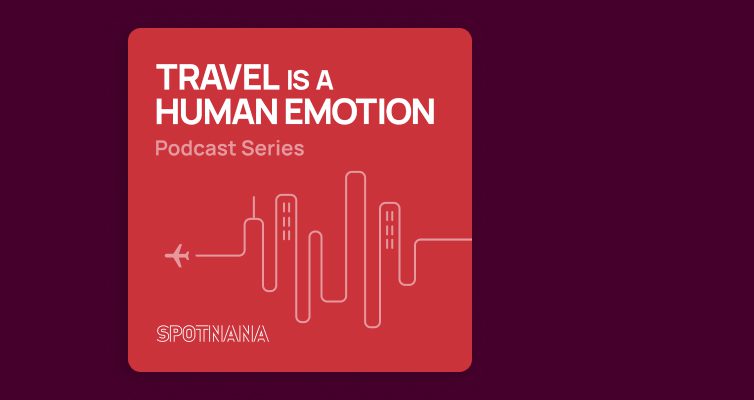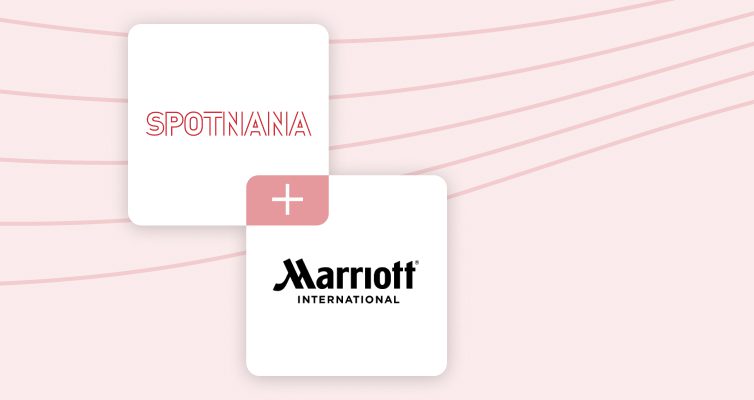Spotnana travel glossary

Spend even a brief time in the business travel world and you’ll find yourself bombarded with a barrage of jargon and acronyms. TMC? BSP? GDS?
We call it the alphabet soup, and we don’t think you should have to swallow it alone. In this handy glossary, you’ll find a brief rundown of all the terms you need to know to get your footing in corporate travel.
Whether you’re new to the industry or a seasoned veteran, keep this guide on hand to help navigate the complexity of industry jargon.
ADR – Average Daily Rate
Average daily rate (ADR) is a metric hotels use to measure the average price paid for rooms sold. It’s calculated as room revenue/rooms sold. For example, if a hotel property sells 100 rooms in a night with a room revenue of $15,000, the hotel’s ADR is $150. ADR may also be referred to as average room rate (ARR).
Aggregator
A travel aggregator is a platform that pulls together content from various sources, including airlines, hotels, car rental companies, and other travel vendors. A well-known aggregator in the corporate travel industry is Travelfusion, which offers APIs to TMCs, online booking tools, and other travel service providers, allowing them to access and integrate travel content, particularly low-cost carriers, into their own booking and reservation systems.
Ancillaries
Ancillaries are airline products or services you can purchase in addition to what’s included in your air ticket. Examples include lounge access, checked baggage, priority boarding, and in-flight meal services. Carriers see ancillaries as revenue-generating opportunities and want to be able to sell them alongside an air ticket. Similarly, travel buyers want to secure ancillaries for employees as a business travel benefit. A key benefit of New Distribution Capability (NDC) is the easy purchase of ancillaries and air tickets together.
API – Application Programming Interface
An application programming interface (API) allows different software programs to communicate with each other. For example, when you book an Uber to the airport for a business trip, APIs make it possible for the driver to find your exact location, for you to pay for the ride with your corporate card, and for you to leave a review after the ride is over. Spotnana’s Travel-as-a-Service platform uses open APIs, which makes it easy to integrate any technology or travel content source within the platform.
ARC – Airlines Reporting Corp.
The Airlines Reporting Corp. (ARC) is a U.S. company that regulates ticket sales and transactions between airlines and U.S.-based travel agencies. ARC provides accreditation to travel agents, travel management companies, and corporate travel departments, which grants them the ability to issue air tickets from more than 200 airlines worldwide. The company also aggregates air transaction data and provides additional services to agencies, including data analytics and professional training. ARC is owned by nine major airlines.
BAR – Best Available Rate
The best available rate (BAR) describes the lowest unrestricted rate for a hotel room on a set date. Dynamic hotel discounts or rates are calculated as a percentage off BAR. For example, if a company has negotiated a 20 percent discount off BAR and the BAR is $150 on a given day, then the company’s traveler should be charged a rate of $120.
Base Fare
The base fare is the price of an airline ticket, excluding taxes, fees and surcharges. Some base fares include certain amenities as standard. For example, an international economy fare with a full-service carrier will likely include checked baggage, meal service, and advanced seat selection. A basic economy fare or low-cost carrier fare for that same international journey would cover only the ticket cost and a cabin bag. Base fares are important to understand to avoid overpaying for amenities.
BSP – Billing and Settlement Plan
A billing and settlement plan (BSP) is a global electronic system created by the International Air Transport Association (IATA) to act as a payment and data go-between for travel agents and airlines. Rather than every TMC working directly with each airline for every individual customer transaction, the BSP consolidates payments and keeps track of which party owes or is owed payment. BSP improves airlines’ financial control and cash flow, simplifying the payment process for TMCs and airlines.
Central Card
A central card is a payment solution that consolidates and streamlines the payment of travel-related expenses for corporations and TMCs. Central cards allow companies to easily pay and bill flight, rental car, rail, hotel, and TMC fee expenses. An example of a central card provider is AirPlus.
CRS – Central Reservation System
A central reservation system (CRS) is a platform owned, leased, or licensed by hotel companies to process reservations for all properties through a single, unified database that connects to and communicates with on-property software systems. The CRS, sometimes referred to as global reservation systems (GRSs) by certain hotel chains, are considered the “brain” of a hotel company, distributing inventory and pricing information to various other internal systems and sales channels, including GDSs, OTAs, and metasearch engines.
Conferma Pay
Conferma Pay provides virtual payment solutions to businesses, primarily within the travel industry. Conferma Pay virtual cards can be instantly issued to employees, contractors, and customers from a centralized account, making it easy to track and control payments while eliminating the need for individuals to pay for expenses via personal card. The company was founded in 2005 and acquired by Sabre in 2022.
Codeshare
A codeshare is an agreement between two or more airlines that allows a carrier to market and sell seats on flights operated by another carrier. For example, you might travel from New York JFK to London Heathrow on a flight booked with American Airlines but operated by British Airways. Codesharing also enables travelers to combine flights from multiple carriers within a single itinerary.
Continuous Pricing
Continuous pricing describes a relatively new, NDC-enabled practice among air carriers to price airfares dynamically. Traditional airline pricing is hindered by the GDS EDIFACT data standard, which uses the 26 letters of the alphabet to classify fares into buckets. An airline sets each bucket at a certain price point and, historically, there hasn’t been a way to set a price between these buckets. NDC-enabled continuous pricing allows airlines greater flexibility to charge customers according to their projected willingness to pay.
CTD – Corporate Travel Department
A corporate travel department (CTD) acts as an internal travel agency within a company. CTDs must be ARC or IATA accredited. This designation enables them to purchase and distribute travel services directly to employees. Large corporations or companies looking to cut fees paid to TMCs may favor a CTD setup.
Direct Connect
A direct connect is a technical link between a travel supplier and a TMC, CTD, or other travel service provider without the involvement of a third-party intermediary such as a GDS. Direct connections are growing in popularity as a way for corporations and TMCs to adopt NDC and as a way to bypass legacy systems for greater flexibility, more options, and improved content visibility.
Display Bias
Display bias in travel distribution is the practice of prioritizing certain flight, hotel, rental car, or rail options over others in search results for financial gain. For example, travel management companies and online travel agencies regularly elevate travel providers that pay high commission fees in search results. Global distribution systems also practice display bias, prioritizing travel suppliers that pay incentive fees ahead of those that don’t in agent desktop displays.
Duty of Care
Duty of care is a company’s legal obligation to look after its employees. Within travel, duty of care focuses on the policies, procedures and partners a company puts in place to protect travelers’ health, safety, and wellbeing before, during, and after a business trip. Duty of care is sometimes used interchangeably with traveler safety or travel risk management.
EMD – Electronic Miscellaneous Document
The electronic miscellaneous document (EMD) is a standard paperless document used by the aviation industry to fulfill travel-related services. EMDs enable travel agents to sell ancillaries or pass on airline service fees to customers via the GDS and also facilitate interline settlement between airlines. IATA created the EMD standard to electronically document ancillary revenue, which includes non-ticket sales and transactions. EMDs replace miscellaneous charges orders (MCOs) and other outdated and inefficient paper documents.
Fare Rules
Fare rules determine an air ticket’s cost and limitations. Examples of fare rules include whether a ticket is refundable, whether a traveler incurs a penalty for changing the departure or return dates, or whether a passenger is allowed a cabin bag. Fare rules can be very complex, and some don’t make sense for corporate travelers. Travel managers may prohibit travelers from booking certain fares, such as basic economy, because the fare rules are too restrictive.
FOP – Form of Payment
Form of payment (FOP) describes the method used to pay for services, such as corporate cards, personal credit cards, and virtual cards. A company’s travel policy or a travel provider may opt to allow individuals to use multiple FOPs to purchase travel. For example, a traveler could book a flight using their corporate card but then use their personal card to pay for seat upgrades or ancillaries to make their journey more comfortable.
FFP – Frequent Flyer Program
A frequent flyer program (FFP) is a loyalty program that rewards travelers for flying with an airline or its partners. FFPs allow travelers to collect points or miles and redeem them for free flights or other benefits such as seat upgrades, lounge access, and priority boarding. Frequent business travelers value FFPs because of the benefits they deliver. These programs, however, can also lead to poor policy compliance and increased costs as travelers book based on what earns them air miles rather than follow their company’s policy.
GDS – Global Distribution System
A global distribution system (GDS) is a digital system that TMCs and other providers use to access flight, hotel, and car rental rate information, as well as to book trips and manage reservations. Major GDSs include Sabre, Amadeus, Travelport, and Travelsky. GDSs connect to a large number of travel providers, giving users access to a broad range of travel inventory and content from one centralized point. Traditional GDSs feature text-based interfaces that use EDIFACT (Electronic Data Interchange for Administration, Commerce and Transport) codes and agents navigate them using keyboard commands.
Ghost Card
A ghost card refers to a credit card number linked to a specific company department that employees can use to charge expenses. There is no physical credit card; expenses are paid through a centrally billed high-limit charge account. It’s similar to a lodge card.
Group Booking
A group booking is a reservation for multiple people traveling together to the same destination or staying in the same hotel. Most airlines, hotels, and rail providers define a group as consisting of at least 10 people. Travel providers typically track group bookings as separate from transient business travel, though these bookings may fall into the category of MICE, depending on the provider’s classification. Suppliers may provide some level of discount for group bookings.
IATA – International Air Transportation Association
The International Air Transport Association (IATA) is a trade association that sets aviation industry commercial standards, establishes safety practices, and offers services and support for airlines across the globe. It provides accreditation to travel agents, TMCs, and CTDs, which gives these entities the power to issue air tickets, access IATA’s BSP, and enjoy exclusive offers and benefits.
Interlining
Interlining describes agreements between two or more air carriers to accept the other’s tickets and baggage. These partnerships allow a traveler to, for example, fly from London to Paris to Hong Kong on a single itinerary using multiple carriers without needing to collect their bags in Paris and check back in for their flight to Hong Kong. Interlining smooths the connection between flights for passengers but it differs from codesharing, which concerns airline marketing relationships.
LCC – Low-Cost Carriers
Low-cost carriers (LCCs) are airlines that sell basic fares with reduced service as a standard. Often referred to as budget or no-frills airlines, LCCs typically service short-haul routes and charge additional fees for amenities like beverages, baggage, and ticket flexibility. Though LCCs lack full-service comforts, they can nevertheless be a popular choice among business travelers on certain routes. Many LCCs are unavailable via the GDS and instead must be accessed via direct connections or aggregators.
Lodge Card
A lodge card is a centralized payment solution TMCs offer to clients for travel purchases. Typically, a company or various cost centers within a company receive a virtual credit card number to pay for things like flights or hotel reservations but not meals or incidentals. The client then receives a single, consolidated billing statement for all the purchases made over a specific period, streamlining the payment and expense process.
Loyalty Program
A loyalty program is a scheme in which service providers grant offers and benefits to members in exchange for making purchases with that service provider or its partners. For example, a hotel loyalty program rewards a traveler who stays with the hotel chain with points redeemable for room upgrades, room discounts, free room nights, or access to special benefits on-property or with other supplier partners. Loyalty programs can entice travelers to use a particular vendor over another, driving policy violations in corporate travel programs.
MCO – Miscellaneous Charges Order
A miscellaneous charges order (MCO) is a document issued by an airline or TMC to process the payment of travel arrangements other than airfares. For example, an airline may issue an MCO for excess baggage fees or to compensate a traveler for a canceled flight. MCOs can be overly complex, difficult for travelers to understand, and inefficient to process. EMDs are gradually replacing MCOs.
Metasearch
Metasearch platforms consolidate and display travel content options gathered from a variety of other search engines. Metasearch allows for easy comparison of the widest possible range of options. Travel metasearch sites, such as Kayak and Skyscanner, don’t allow you to book directly with them; rather, they redirect you to the travel supplier or third party through which the flight, hotel, rail, or rental car offer originated.
MICE – Meetings, Incentives, Conferences and Events
MICE stands for meetings, incentives, conferences and events. MICE is still a segment within the world of business travel, but companies and travel suppliers tend to treat it as a separate segment distinct from transient business travel.
Net Rates
A net rate refers to the lowest hotel room price for a reseller, excluding taxes and commissions. Hotels may offer net rates to travel management companies instead of paying commissions on rooms sold. The TMCs then add a markup to these rates when they sell them to customers. These markups contribute to a TMC’s supplier revenues.
NDC – New Distribution Capability
New Distribution Capability (NDC) is an XML-based data transmission standard created in 2012 by IATA. Airlines use NDC to deliver air offers, services, and bundles to technology providers, TMCs, and corporations without the limitations of the traditional GDS. For example, NDC allows an airline to create a business traveler-targeted bundle that includes a premium economy seat plus ancillaries, including priority check-in, early boarding and lounge access—something that wouldn’t be possible through traditional GDS EDIFACT.
NGS – Next Generation Storefront
Next Generation Storefront (NGS) is a data standard created by ATPCO. Its purpose is to improve how distributors display, organize, and locate airline products and services for air customers. ATPCO moved away from pushing NGS display standards in 2021.
ONE Order
ONE Order is an XML-based data standard created by IATA to simplify airline reservation, delivery, and accounting systems. ONE Order would put in place a single, consolidated record (order) and replace the current legacy booking and ticketing records (PNRs, e-tickets, and EMDs).
Open Booking
Open booking refers to the practice of allowing employees to arrange travel using any website, app, or platform they like instead of requiring them to book via company-designated tools or channels. Such policies grew in popularity during the mid-2010s as corporate online booking tools failed to keep pace with consumer travel platforms amid the rise in mobile booking. Programs that adopt open booking policies still have ways to track travel and expenses, typically by mandating company-sanctioned expense, risk management, and itinerary capture tools.
Order Management
Order management is the process of handling and fulfilling customer purchase requests for flights and related services. Traditional order management is handled via the passenger service system (PSS), which uses multiple systems to generate, process and store records (PNRs, e-tickets, and EMDs). ONE Order aims to simplify and streamline order management by creating a single record.
OTA – Online Travel Agency
An online travel agency (OTA) is a website that allows travelers to research, plan, and book travel. OTAs offer flights, hotels, rental cars, cruises, tours, vacation packages, short-term rentals, and more. Examples of OTAs include Expedia and Booking.com. Travel managers often blame OTAs for driving travel policy violations—business travelers who are comfortable booking via OTAs for personal travel may believe these sites deliver better value than their company’s online booking tool. Modern corporate travel platforms, however, give travelers access to OTA content and many more options, eliminating the need to book outside of policy.
PCC – Pseudo City Code
A pseudo city code (PCC) is an alphanumeric code within the GDS that identifies and differentiates between TMC offices. PCCs are sometimes called office IDs or subscriber IDs. PCCs are relevant to adding negotiated rates into the GDS as these rates can be assigned to TMCs using their unique identifier code.
PNR – Passenger Name Record
The passenger name record (PNR) is a six-figure customer reservation number created in the GDS at the time of booking. PNRs use a 200-character unstructured, free text field to communicate information about a traveler’s itinerary and personal information to agents and travel providers. The PNR is considered error-prone and inefficient; modern travel platforms, Spotnana included, have established their own systems of record using structured data.
PSS – Passenger Service System
The passenger service system (PSS) is a set of software applications airlines use to manage all passenger-related operations. A PSS consists of a reservations system, an inventory system, and a departure control system.
Rack Rate
The rack rate is the price of a hotel room before applying any discount or special offer. Other terms used interchangeably with rack rate include base rate, published rate, walk-in rate, and market rate. Rack rates are typically the most expensive standard rate (and are, therefore, different from BAR) and serve as the base for any discounts.
Rail Comfort Options
Rail comfort options describe the various classes or service levels for train passengers. Similar to airline fare classes, rail comfort options vary by rail provider, destination, and length of journey. Examples include standard seats, first class, business class, quiet cars, sleeping compartments, and accessible seats.
Rate Parity
Rate parity refers to maintaining consistent prices across all sales channels. Rate parity is typically enforced by contractual agreements between hotel companies and owners and third-party vendors/resellers so that one party cannot undersell another. Some countries, including France, Italy, Austria, and Belgium, have opted to make rate parity illegal to protect independent hotel owners from paying large commissions to third-party distributors.
Rate Shopping
Rate shopping refers to checking prices daily or multiple times a day across a range of sources and channels to gather real-time intelligence about hotel rates. There are rate shopping companies set up to service hotel suppliers, such as OTA Insight, and others set up to service travel buyers, such as TRIPBAM. This market intelligence makes it easier for hoteliers to price hotel rooms competitively and for travel buyers to negotiate corporate rates and track dynamic discounts.
SSO – Single Sign-On
Single sign-on (SSO) allows website and app users to access different software systems using a single account that they only log into once. If you’ve ever signed into an app or website with your Apple ID or Google, you have used SSO. This type of authentication makes for a better and more efficient user experience, eliminating the need to create and remember multiple passwords.
TaaS – Travel-as-a-Service
Travel-as-a-Service describes Spotnana’s technology and business model, which focuses on modernizing travel industry infrastructure via a unified cloud-based technology stack built on microservices and open APIs. The term is a play on software-as-a-service (SaaS) companies, which are also cloud-based and offer open APIs. TaaS accelerates innovation for channel partners, delivers unparalleled experiences to business travelers, and provides a suite of powerful tools to travel managers.
TMC – Travel Management Company
Travel management companies (TMCs), or corporate travel agencies, help companies organize, manage, and book business trips. They assist travelers, connect corporations to supplier content, offer exclusive rates and airfares, provide data reporting and analytics, and make recommendations to improve travel programs.
VAT – Value Added Tax
Value added tax is a tax that’s added to goods and services in more than 170 countries around the world. Sometimes referred to as a goods and services tax (GST), VAT differs from U.S. sales tax in that VAT is levied on products at every stage of the supply chain rather than paid for only by the end-consumer. In some cases, VAT can be reclaimed by foreign visitors to a country.
Virtual Card
A virtual card is a digital form of payment that features a unique card number, expiration date, and CVV code. Unlike a physical credit card, virtual cards are single- or limited-use. They represent a secure way to pay for business travel expenses, particularly for individuals who would otherwise need to use their personal card and wait to be reimbursed.






